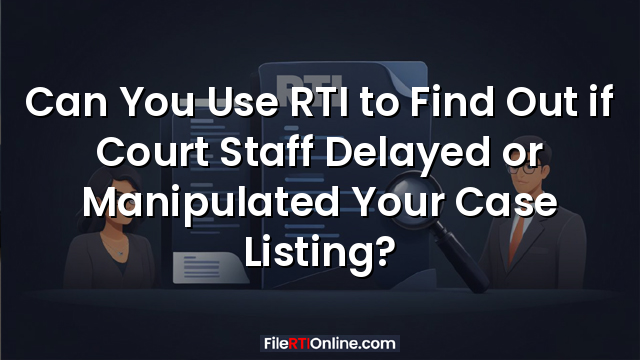Can You Use RTI to Prove That Court Staff Delayed or Manipulated Your Case Listing? Here’s What CIC Held
Many litigants feel frustrated when their cases do not get listed for months—or even years. A common suspicion is that the court registry staff or registrar may be deliberately delaying the listing, or colluding with the opposite party.
This leads to an important question:
Can you file an RTI to find out if the Registrar or Court Staff purposely delayed your case?
A Central Information Commission (CIC) decision clarifies this clearly: No.
RTI cannot be used to demand explanations, opinions, allegations of collusion, or motives behind administrative actions.
Here is a simplified explanation of the case.
Background: RTI Filed Alleging Registrar–Opposite Party Collusion
The applicant approached the National Consumer Disputes Redressal Commission (NCDRC) seeking information on a serious allegation:
Whether the Registrar, in collusion with the opposite party, intentionally did not list his appeal for 6 years.
The Public Information Officer (PIO):
- Rejected the RTI request
- Stated that the query does not fall under “information” as per Section 2(f) of the RTI Act.
Because RTI can only provide material records, documents, files—not opinions or accusations.
The matter reached the Central Information Commission (CIC).
CIC Proceedings: What Happened During the Hearing
The NCDRC clarified:
- The appellant was seeking an opinion, not information.
- Records showed the appeal was listed more than 15 times.
- The appellant himself was present for many hearings.
- Therefore, the allegation of “not listing for six years” had no factual basis.
Since there was no material record supporting the allegation, the information simply did not exist.
CIC’s Final View: RTI Cannot Be Used to Prove Collusion
The CIC held:
1. RTI cannot be used to ask for opinions, explanations, or allegations.
RTI gives access only to:
- files
- documents
- notes
- orders
- records
It cannot be used to ask:
- “Why did this happen?”
- “Did the officer intentionally delay my case?”
- “Was there corruption or collusion?”
- “What was in the mind of the Registrar?”
Such questions are outside the definition of information under Section 2(f).
2. If no record exists, the PIO cannot create one.
RTI does not require:
- Investigation
- Interpretation
- Giving reasons
- Justifying administrative actions
- Proving misconduct
3. Since the case was actually listed many times, the allegation had no merit.
The records contradicted the applicant’s allegation.
Hence, there was no intervention required .
So Can You Use RTI to Check If Court Staff Colluded or Delayed Your Case?
No — RTI cannot be used for:
- Accusing the Registrar or staff of collusion
- Asking why your case wasn’t listed
- Demanding explanations or reasons behind delays
- Proving misconduct or corruption
- Seeking opinions or mental processes of officers
RTI CAN be used for:
You can ask for:
- Listing history of your case
- Dates when the matter was posted
- Any file noting regarding listing
- Copies of administrative orders affecting listing
- Registry rules on case listing
- Procedure followed in your specific case (if in records)
These are documented facts.
But anything beyond that—especially accusations—will not be covered.
Conclusion
RTI is a tool for accessing records, not for proving allegations or seeking explanations. If you believe that court staff intentionally delayed your case or acted improperly, the proper forum is:
- Complaint to the Registrar General
- Administrative grievance
- Judicial review in the High Court
RTI cannot establish collusion.


